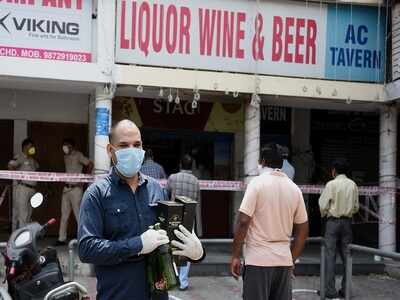
CHANDIGARH: The excise policy of the UT administration in Chandigarh has come under the scanner of Punjab and Haryana high court, which on Tuesday issued notice to the administration on a plea alleging that the policy has led to complete cartelization and monopoly of certain individuals.
While giving the UT administration to submit a reply within 10 days, the HC has made it clear that the “allotments which have been made meanwhile shall be subject to final outcome of this writ petition”.
Division bench comprising Justice Rajan Gupta and Justice Karamjit Singh passed the orders while hearing the petition filed by Rajbir Singh, 52, a resident of Sector-8, Chandigarh. The petitioner has sought directions to quash the excise policy for the year 2020-21 being manifestly arbitrary and beyond the provisions of law.
Counsel for the petitioner, Anand Chhibbar submitted that the policy adopted by the administration is leading to complete cartelization and monopoly of certain individuals through their firms. While submitting that the policy is wholly arbitrary, counsel also pointed out that certain internal departmental stores have been given the licence at the rate of Rs 20 lakh to sell foreign liquor while L-2 retailers have to pay approximately Rs 4 crores as licence fees.
Chibbar had mainly challenged the clause-7, 10, 11, 13, 19, 36 (i, iii, iv), 41, 45, 57, 63, 69, 71, 68, 72 of the excise policy notified by the UT administration for the year 2020-21 while highlighting the alleged colourable exercise aimed to benefit certain individuals. Because there being only five wholesalers of a particular brand, it creates an unfair advantage to the said wholesalers who may choose to sell or make brands available only to their own retail vends or vends of their friends and family, thereby making it difficult for independent non-cartel retail vend owners to lift their stock of IFL, argued the counsel while highlighting one of the arbitrariness in the existing policy.
The petitioner, who owns and operates a retail liquor vend situated at Sector-17 Chandigarh, told the HC that he had entered into the liquor business in 2019-20 and tried to make his liquor retail vend profitable in accordance with the rules governing the same.
“While pursuing for profit business venture, the petitioner has been very vocal about the challenges of cartelization existing in the liquor trade in Chandigarh due to which there is no profits for any licensee who wishes to operate the liquor vend in a legitimate manner, and has always tried to suggest inputs to the excise department of UT Chandigarh in a bid to stop cartelization and prevent loss to independent liquor vend like his, the loss to the exchequer as well as the general public from spurious alcohol, which has drawn him a lot of flat from errant officials of the UT administration,” counsel for the petitioner argued.
The matter would now come up for hearing on July 8.
While giving the UT administration to submit a reply within 10 days, the HC has made it clear that the “allotments which have been made meanwhile shall be subject to final outcome of this writ petition”.
Division bench comprising Justice Rajan Gupta and Justice Karamjit Singh passed the orders while hearing the petition filed by Rajbir Singh, 52, a resident of Sector-8, Chandigarh. The petitioner has sought directions to quash the excise policy for the year 2020-21 being manifestly arbitrary and beyond the provisions of law.
Counsel for the petitioner, Anand Chhibbar submitted that the policy adopted by the administration is leading to complete cartelization and monopoly of certain individuals through their firms. While submitting that the policy is wholly arbitrary, counsel also pointed out that certain internal departmental stores have been given the licence at the rate of Rs 20 lakh to sell foreign liquor while L-2 retailers have to pay approximately Rs 4 crores as licence fees.
Chibbar had mainly challenged the clause-7, 10, 11, 13, 19, 36 (i, iii, iv), 41, 45, 57, 63, 69, 71, 68, 72 of the excise policy notified by the UT administration for the year 2020-21 while highlighting the alleged colourable exercise aimed to benefit certain individuals. Because there being only five wholesalers of a particular brand, it creates an unfair advantage to the said wholesalers who may choose to sell or make brands available only to their own retail vends or vends of their friends and family, thereby making it difficult for independent non-cartel retail vend owners to lift their stock of IFL, argued the counsel while highlighting one of the arbitrariness in the existing policy.
The petitioner, who owns and operates a retail liquor vend situated at Sector-17 Chandigarh, told the HC that he had entered into the liquor business in 2019-20 and tried to make his liquor retail vend profitable in accordance with the rules governing the same.
“While pursuing for profit business venture, the petitioner has been very vocal about the challenges of cartelization existing in the liquor trade in Chandigarh due to which there is no profits for any licensee who wishes to operate the liquor vend in a legitimate manner, and has always tried to suggest inputs to the excise department of UT Chandigarh in a bid to stop cartelization and prevent loss to independent liquor vend like his, the loss to the exchequer as well as the general public from spurious alcohol, which has drawn him a lot of flat from errant officials of the UT administration,” counsel for the petitioner argued.
The matter would now come up for hearing on July 8.

Coronavirus outbreak
Trending Topics
LATEST VIDEOS
More from TOI
Navbharat Times
Featured Today in Travel
Quick Links
Kerala Coronavirus Helpline NumberHaryana Coronavirus Helpline NumberUP Coronavirus Helpline NumberBareilly NewsBhopal NewsCoronavirus in DelhiCoronavirus in HyderabadCoronavirus in IndiaCoronavirus symptomsCoronavirusRajasthan Coronavirus Helpline NumberAditya ThackerayShiv SenaFire in MumbaiAP Coronavirus Helpline NumberArvind KejriwalJammu Kashmir Coronavirus Helpline NumberSrinagar encounter
Get the app









